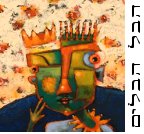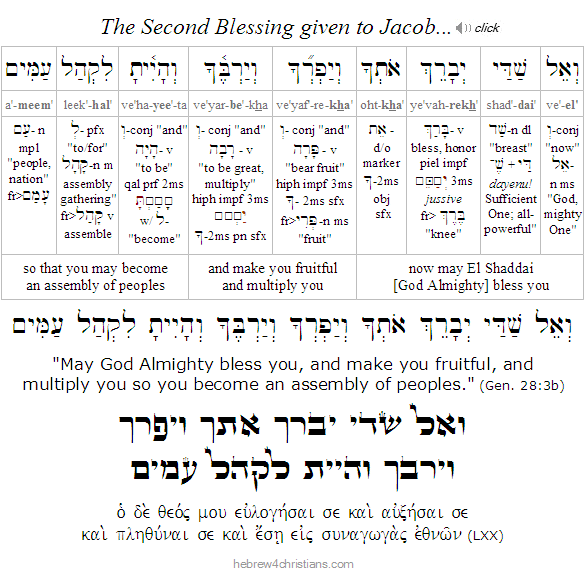|
When we think of Jacob as a young man, we tend to recall the dramatic episode when he disguised himself as Esau to "steal" the blessing from his father Isaac. However the Torah tells us that Jacob actually received two blessings from his father. The first blessing was given to a disguised Jacob and it focused on material blessings: the "dew of heaven," the "fatness of the earth," "plenty of grain and wine," political power and hegemony (Gen. 27:28-29), whereas the second blessing was given to an undisguised Jacob and it focused on his role as God's chosen patriarch of the people of Israel (Gen. 28:3-4).
The difference between these blessings turned on Isaac's restored vision. His first blessing was addressed to the character of Esau as his "natural choice," whereas his second blessing looked beyond mere appearances to behold the vision that was originally given to his father Abraham: "Now may El Shaddai bless you, make you fruitful and multiply you so you become an assembly of peoples. And may He grant the blessing of Abraham to you and your offspring" (Gen. 28:3-4).
וְאֵל שַׁדַּי יְבָרֵךְ אתְךָ
וְיַפְרְךָ וְיַרְבֶּךָ וְהָיִיתָ לִקְהַל עַמִּים
וְיִתֶּן־לְךָ אֶת־בִּרְכַּת אַבְרָהָם
לְךָ וּלְזַרְעֲךָ אִתָּךְ
ve·el · Shad·dai · ye·vah·rekh · oht·kha
ve·yaf'·re·kha · ve·yar·be'·kha · ve·ha·yee'·ta · leek·hal · a·meem
ve·yee·ten · le·kha · et · beer·kaht · av·rah·hahm
le·kha · ool·zar·a·kha · ee·takh

"May El Shaddai bless you,
make you fertile and numerous to become an assembly of peoples.
And may He grant the blessing of Abraham
to you and your offspring."
(Gen. 28:3-4)

- Isaac's second blessing to Jacob
In a sense, the self-effacing, disciplined, and strong-willed Isaac abandoned his "natural vision" that sought to install Esau as the next patriarch -- despite the objection from his faithful wife Rebekah -- by finally surrendering to the vision of his father Abraham. Isaac's entire life was a sort of overreaction to his father - an "antithesis to Abraham's thesis." By choosing to bless Jacob a second time -- this time with his eyes wide open -- Isaac revealed that he had finally accepted the grace of God that was revealed to his father Abraham.
Recall also that after Esau had discovered that the blessing was given to Jacob, he lamented and pleaded with his father to bestow upon him a blessing as well. It is interesting to note that the "residual" blessing that Isaac gave to Esau was the exact inverse of that given to Jacob: the "fatness of the earth" was put before the "dew of heaven" (compare Gen. 27:39 with Gen. 27:28), indicating that receiving sustenance from heaven is of greater value than finding earthly prosperity.
And indeed, Jacob was "blessed with earthly trouble" his whole life, which caused him to rely on the "dew from heaven," whereas Esau was "blessed" with prosperity (and trouble) that came from trafficking in this world. Regarding Esau it may aptly be said: "Be careful what you wish for -- you just might get it!" (Heb. 12:17).
Hebrew Lesson:
Genesis 28:3b Hebrew reading (click):
Note: Isaac was 60 years old when his two sons were born (Gen. 25:24-26), and according to Jewish tradition, Jacob and Esau were 63 years old at the time of the blessings (Yevamot 6a), making Isaac 123 years old at the time. He died at the age of 180 (Gen. 35:28-29), making him the longest living of the three patriarchs. The Talmud further states that Jacob first fled to the School of Shem (i.e., Malki-Tzedek) before proceeding to Padan Aram, so that actually arrived at Laban's home when he was 77 years old....
The metaphors the "dew of the heavens" and the "fatness of the earth" suggest focus, the former alluding to spiritual blessing and the latter to worldly good... Hence Jacob was vexed and sent into exile, whereas Esau inhabited Mount Seir and embedded himself in the land. Isaac's first blessing (to a disguised Jacob), does not contradict this comment, since Isaac was speaking prophetically about Jacob and Esau, and only later did he reaffirm the prophecy by bestowing upon Jacob the blessing of his father Abraham...
|




